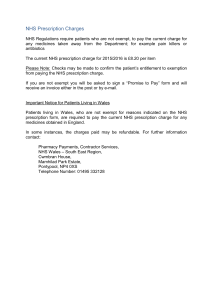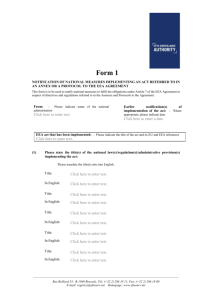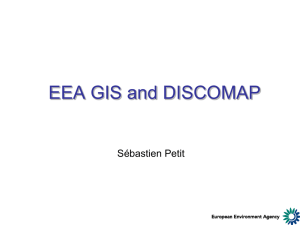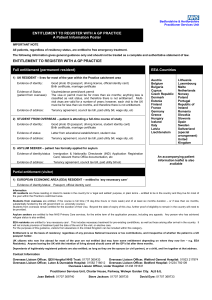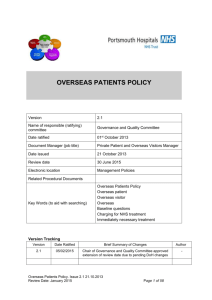ARE_YOU_VISITING_THE_UK
advertisement
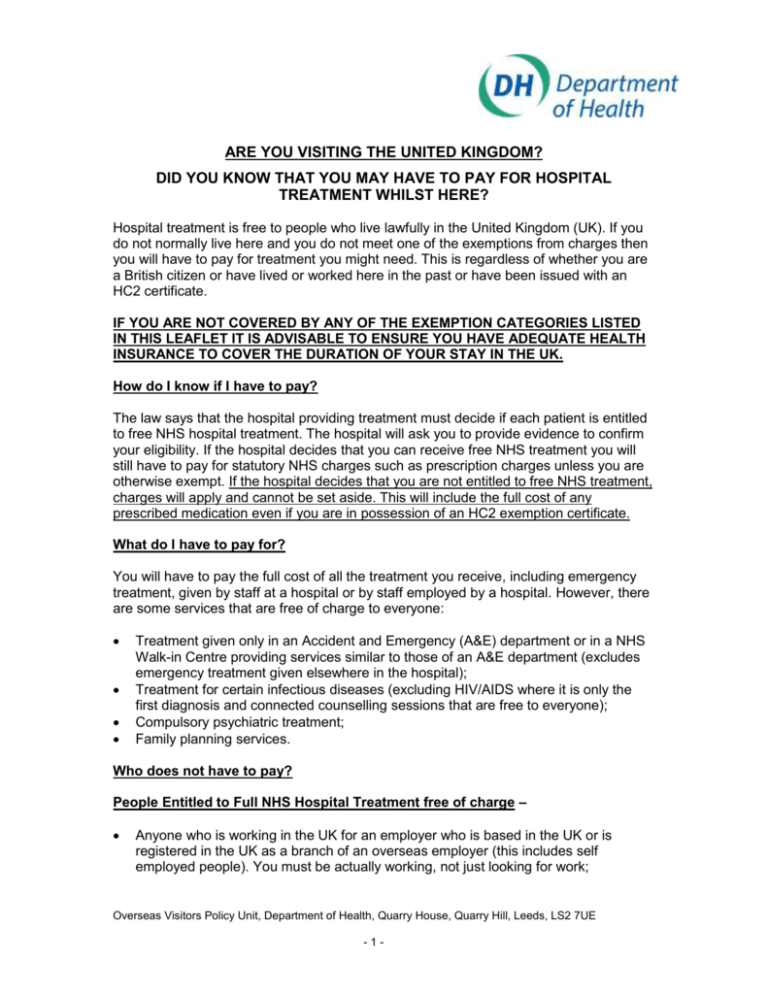
ARE YOU VISITING THE UNITED KINGDOM? DID YOU KNOW THAT YOU MAY HAVE TO PAY FOR HOSPITAL TREATMENT WHILST HERE? Hospital treatment is free to people who live lawfully in the United Kingdom (UK). If you do not normally live here and you do not meet one of the exemptions from charges then you will have to pay for treatment you might need. This is regardless of whether you are a British citizen or have lived or worked here in the past or have been issued with an HC2 certificate. IF YOU ARE NOT COVERED BY ANY OF THE EXEMPTION CATEGORIES LISTED IN THIS LEAFLET IT IS ADVISABLE TO ENSURE YOU HAVE ADEQUATE HEALTH INSURANCE TO COVER THE DURATION OF YOUR STAY IN THE UK. How do I know if I have to pay? The law says that the hospital providing treatment must decide if each patient is entitled to free NHS hospital treatment. The hospital will ask you to provide evidence to confirm your eligibility. If the hospital decides that you can receive free NHS treatment you will still have to pay for statutory NHS charges such as prescription charges unless you are otherwise exempt. If the hospital decides that you are not entitled to free NHS treatment, charges will apply and cannot be set aside. This will include the full cost of any prescribed medication even if you are in possession of an HC2 exemption certificate. What do I have to pay for? You will have to pay the full cost of all the treatment you receive, including emergency treatment, given by staff at a hospital or by staff employed by a hospital. However, there are some services that are free of charge to everyone: Treatment given only in an Accident and Emergency (A&E) department or in a NHS Walk-in Centre providing services similar to those of an A&E department (excludes emergency treatment given elsewhere in the hospital); Treatment for certain infectious diseases (excluding HIV/AIDS where it is only the first diagnosis and connected counselling sessions that are free to everyone); Compulsory psychiatric treatment; Family planning services. Who does not have to pay? People Entitled to Full NHS Hospital Treatment free of charge – Anyone who is working in the UK for an employer who is based in the UK or is registered in the UK as a branch of an overseas employer (this includes self employed people). You must be actually working, not just looking for work; Overseas Visitors Policy Unit, Department of Health, Quarry House, Quarry Hill, Leeds, LS2 7UE -1- Any unpaid worker with a voluntary organisation offering services similar to those of a Health Authority or Local Authority social services department; Any full time student on a course of at least 6 months duration, or, if less than 6 months, a course substantially funded by the UK government; Anyone who has come to live permanently in the UK. If you make an application for permanent residence after you get here you are chargeable until your application is approved; Anyone who has been lawfully living in the UK for twelve months immediately prior to treatment; Refugees and asylum seekers whose applications are still being considered; Anyone employed on a ship or vessel registered in the UK or working offshore on the UK sector of the Continental Shelf; Anyone who receives a UK war disablement pension or war widows pension; Diplomatic staff working in embassies or Commonwealth High Commissions in the UK; Members of Her Majesty’s UK armed forces*; UK Civil Servants working abroad who were recruited in the UK and employed by Her Majesty’s Government*; Anyone recruited in the UK who works abroad for the British Council or the Commonwealth War Graves Commission*; Anyone who is working abroad in a job financed in part by the UK Government in agreement with the Government or a public body of some other country or territory*; Anyone working abroad for not more than 5 years as long as they have lived legally in the UK for ten continuous years at some point (including self employed people); Anyone working in an EEA country member state and contributing compulsory (not voluntary) UK national insurance contributions (class I or II); Anyone who is a national of an EEA member state, a refugee or stateless person or their dependant or survivor living in an EEA member state who is referred to the UK for specified treatment with an EC form E112 or E123; Anyone who is referred by their home country authorities for specified treatment in the UK under the terms of a bilateral agreement; Anyone who is detained in prison or by the Immigration Authorities in the UK; Serving NATO personnel, posted in the UK, who are not using their own or UK armed forces hospitals; UK state pensioners who have lived lawfully in the UK for 10 continuous years at some point, who now live for not more than 6 months each year in another EEA member state and not less than 6 months each year in the UK; Missionaries working overseas for an organisation principally based in the UK, regardless of whether they are receiving a wage or salary*; Those who have been formally identified or suspected as being a victim of human trafficking*; The spouse or civil partner and any dependent children of anyone who is exempt under the above criteria, if they are living permanently with the exempt person. Coming to visit the exempt person for a few weeks or months does not give exemption. Last updated April 2009 Overseas Visitors Policy Unit, Department of Health, Quarry House, Quarry Hill, Leeds, LS2 7UE -2- * These categories of exemption provide that the spouse/civil partner/dependent children are exempt from charge in their own right so that the principal exempt family member does not have to be in the UK with them at the time of their treatment. People Entitled to Some NHS Hospital Treatment – this is limited to treatment required for any condition that occurred after arrival in the UK (including pre-existing conditions which acutely exacerbate whilst here). Anyone, including a refugee, stateless person or a member of the family of any of them, who is an ‘insured’ resident of an EEA member state and is visiting the UK#; Anyone, or the spouse, civil partner or child of anyone, receiving a UK state pension who has either lived legally in the UK for 10 continuous years at some point or has worked as a UK Civil Servant for at least 10 continuous years; Anyone, or the spouse, civil partner or child of anyone, who is a national of a country that has signed the European Social Charter but is not entitled to be provided with services under a bilateral agreement (currently Turkey) and is genuinely without the means to pay for their treatment; Anyone, or the spouse, civil partner or child of anyone, who has lived legally in the UK for 10 continuous years at some point but who is now living in another EEA member state or in certain countries with which the UK has a bilateral healthcare agreement; Anyone who is entitled to receive industrial injury benefit from Israel if the treatment is in connection with the industrial injury; Anyone living in a country with which the UK has a bilateral healthcare agreement (some bilateral healthcare agreements are limited to nationals of that country). # Also includes treatment for chronic conditions, including routine monitoring. Such persons must show a valid European Health Insurance Card (EHIC). European Economic Area (EEA) member states: Austria, Belgium, Bulgaria, Cyprus (Southern), Czech Republic, Denmark, Estonia, Finland, France, Germany, Greece, Hungary, Italy, Latvia, Lithuania, Luxembourg, Malta, Netherlands, Poland, Portugal, Republic of Ireland, Romania, Slovakia, Slovenia, Spain, Sweden, UK, plus Iceland, Liechtenstein and Norway. Switzerland by special arrangement. Bilateral Healthcare Agreement Countries: Nationals of, and UK nationals in, the following countries: Armenia, Azerbaijan, Belarus, Bosnia, Croatia, Georgia, Gibraltar, Yugoslavia i.e. Serbia & Montenegro, Kazakhstan, Kirgizstan, Macedonia, Moldova, New Zealand, Russia, Tajikistan, Turkmenistan, Ukraine, Uzbekistan. Residents irrespective of nationality of the following countries: Anguilla, Australia, Barbados, British Virgin Islands, Falkland Islands, Iceland, Isle of Man, Montserrat, St. Helena, Turks and Caicos Islands. This leaflet is a general guide and not a full statement of the current regulations. Please ask at the hospital providing treatment for further information or see the Department of Health website at: www.dh.gov.uk/overseasvisitors Last updated April 2009 Overseas Visitors Policy Unit, Department of Health, Quarry House, Quarry Hill, Leeds, LS2 7UE -3-
